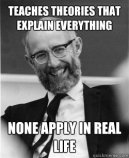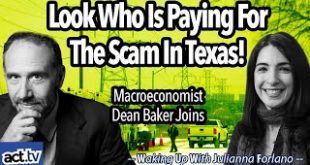from Geoff Davies Analyses of the economic effects of global warming by prominent economists are based on patently invalid arguments, profound ignorance of the global response to solar energy and basic misrepresentation of scientific sources. Their conclusion that the effects are minor is egregiously in error and use of their analyses to advise governments has placed the world in peril. Economist Steve Keen has published a critique (and summary) of analyses by William Nordhaus and others...
Read More »Chicago economics — the triumph of empty formalism
from Lars Syll Vielleicht ist diese Grundperspektive der radikalen Trennung von Form und Gehalt hilfreich, einige zunächst überaus paradoxe Äußerungen von Lucas etwas zu erhellen. Erinnert man sich der Forderungen von Lucas, die Makroökonomik zwingend auf Basis der klassischen Postulate, die Lucas und Sargent (1978) als (a) „Markträumung“ und (b) „Eigennutz“ umrissen hatten, zu errichten, so erstaunt man doch angesichts Passagen wie der folgenden: “In recent years, the meaning of the...
Read More »To prevent the resurgence of the pandemic, can we talk about open-source research?
from Dean Baker As the vaccination campaign picks up steam, we have many public health experts warning us about a possible resurgence of the pandemic due to the spread of new vaccine-resistant strains. The logic is that, as more people are protected against the predominant strain for which the vaccines were designed, it will allow room for mutations to spread, for which the current vaccines may not be effective. This can leave us in a whack-a-mole situation, where we have to constantly...
Read More »Sameness is just wrong
from Peter Radford There is something truly odd about any economist who lives wholly in the world of equilibrium. Truly odd. Just think of what they have to assume to get there: The first step is to make sure the problem they are tackling is well defined. Really well defined. Without ambiguous objects lurking in dark corners. The problem must be well lit and sanitized of any potential taint. And it mustn’t be connected to anything that might, under some circumstance or another,...
Read More »The leap of generalization
from Lars Syll Statistician Andrew Gelman has an interesting blogpost up on what inference in science really means: I like Don Rubin’s take on this, which is that if you want to go from association to causation, state very clearly what the assumptions are for this step to work. The clear statement of these assumptions can be helpful in moving forward … Another way to say this is that all inference is about generalizing from sample to population, to predicting the outcomes of hypothetical...
Read More »The Great Lockdown: A WEA online conference – 15th April to 15th May
This conference is open for submissions SUBMIT YOUR PAPER Aims of the conference The advent of the global Covid-19 crisis created new challenges for businesses, workers, and policymakers. Their outcomes have transforming implications for all countries, industries, businesses of all sizes, and societies. The Covid-19 twin economic and health crises call for a deep reflection on the forces that will shape the future of the global economy. In fact the outbreak of Covid-19 and the...
Read More »The war against scientific economics continues
From the AFEE (Association for Evolutionary Economics): February 24, 2021 Subject: An Open Letter Regarding a Proposal to Dismiss 145 Faculty Members at the University of Leicester We are shocked to hear that 145 staff members have been placed at risk of compulsory redundancy at the University of Leicester. In particular, 16 people within the School of Business...
Read More »Look Who Is Paying For The Scam In Texas! Dean Baker Joins
Julianna welcomes back recurring guest Dean Baker, Macroeconomist and co-founder of the Center for Economic and Policy Research, to discuss the disaster in Texas and who is going to pay for it. And how as other disasters pile up in the US, like wildfires, rapidly intensifying hurricanes, droughts, floods, tornadoes, deep freezes, heat waves, and related pandemics... will there come a point when the US economy won’t be able to handle it? Dean Baker co-founded The Center for Economic...
Read More »Hunger, again
from C. P Chandrasekhar & Jayati Ghosh The world has been preoccupied with the Covid-19 pandemic, and this has also affected policymakers everywhere. There is much more recognition today of the terrible effects of underfunding public health over decades and how this affects the resilience of economies and societies. Yet this official preoccupation with addressing the spread of infectious disease appears to have had an unanticipated negative effect: less policy attention to concerns of...
Read More »AI and democracy
from Peter Radford Just a quick thought prompted by my reading of a talk given by Allison Stanger during the Santa Fe Institute’s 2019 Fall symposium. First she gives us a nice quote from Hannah Arendt’s “The Human Condition” who says the question is not … “whether we are the masters or slaves of our machines, but whether machines still serve the world and its things or if, on the contrary, they and the automatic motion of their processes have begun to rule and even destroy the world and...
Read More » Real-World Economics Review
Real-World Economics Review




